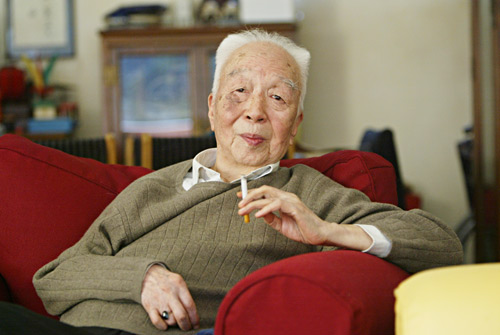|
 |
|
Yang Xianyi at his home in 2006 (TANG SHIZENG) |
Yang Xianyi, China's prolific and consummate translator, died of lymphatic cancer in Beijing on November 23, aged 95. He finally found peace and reunion with his beloved wife and lifelong collaborator, Gladys Yang, who died 10 years ago.
The couple was known throughout China and much of the literary world for the wide range of Chinese classic works from the past two millennia they translated into English. Among the most memorable of these are Selections From Records of the Historian, Selections From the Book of Songs, Tang Dynasty Stories and the great Qing Dynasty novels, A Dream of Red Mansions and The Scholars. The pair's translations also covered modern classics and contemporary writers such as Lu Xun: Selected Works and The Song of Youth.
"It's a huge loss to China's translation circles and international translation and sinology circles," said Feng Qiyong, an expert on China's literary history and A Dream of Red Mansions.
"In the area of Chinese to English translation, Yang is number one in contemporary China, and serves as a model for others," said Huang Youyi, Vice President and Editor in Chief of the China International Publishing Group. Huang said there were at present no more than 100 professionals in China qualified to translate literature.
China boasts a long list of translators who translated from foreign languages into Chinese, but much fewer established Chinese to English translators such as Yang. "The couple have devoted their entire life to translating China's classic literary works into English, and their translations, accurate, vivid and elegant, are second to none among Chinese contemporary translators in terms of quantity and quality as well as significance," said Li Jianjun, a literary critic.
What was precious about Yang was that he "availed himself of his erudition of both Western and Chinese cultures to overcome language barriers and make China's classical masterpieces accessible to a larger Western audience while maintaining their original flavor," said Hu Baomin, Publisher of the Foreign Languages Press where the Yangs worked for more than three decades.
A love story
Born to a wealthy banking family in the westernised port city of Tianjin in 1914, Yang began to pursue higher education at Oxford University in 1936. The university witnessed the sprounting of the love between Yang and Gladys B. Tayler as well as their first attempt at collaborating on translation.
Tayler was born in Beijing in 1919 where her father was a missionary and returned to Britain for education in 1926. She met Yang through a mutual friend at the Oxford China Society.
Reminiscing, Yang once said he was attracted to Tayler not only because of her beauty, but also because of her unpretentious, pure and refined manner, free from the vanity and snnobery typical of an upper-class girl in Britain or China.
With the help of Tayler, Yang translated Li Sao, or The Lament, into an epic poem in heroic couplets at the age of 24. Later Yang changed his major from French Literature to English Literature while Tayler became Oxford University's first graduate in Chinese Literature.
With a mutual interest in Chinese classical literature, they married and returned to China in 1940. Tayler became Gladys Yang and Yang's partner in both life and introducing Chinese classics to the English-speaking world.
During their nearly 60 years of marriage, the couple translated more than 100 literary works of nearly 10 million English words or Chinese characters, wrote their autobiographies, and supported each other in surviving the chaotic "cultural revolution" (1966-76).
In her incomplete autobiography, Gladys Yang wrote: "Unlike many foreign friends here, I came to China not for revolution, not to learn China's experience, but out of my love for Yang Xianyi, my beautiful memories of my childhood spent in Beijing and my admiration for China's anicient culture."
| 